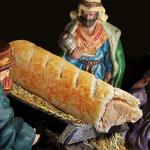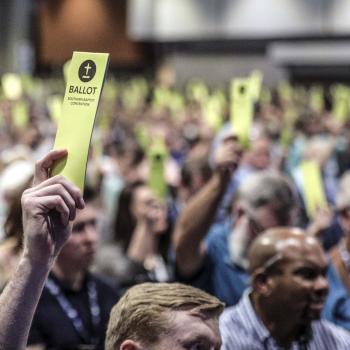I got wonderful, terrible news on Friday: the second season of The Crown appeared on Netflix. Wonderful because I thoroughly enjoyed the first ten-episode season and was eager to see the story of Queen Elizabeth II (played by Claire Foy) and postwar Britain continue to unfold. Terrible because I’m now even more tempted than usual to put off grading all the hard work done by my students!
So I’m going to try to be good and save my Crown binge for after Christmas. But having read ahead a bit, I knew that I had to carve out an hour to watch the sixth episode of the new season. Not only does it deal with the Nazi dalliances of Elizabeth’s abdicated uncle (the former King Edward VIII-turned-the Duke of Windsor), but it dramatizes the queen’s first encounter with Billy Graham.
While the lavishly produced show has a historical consultant and team of researchers, creator David Morgan has sometimes exercised creative license. So maybe especially in an episode entitled “Vergangenheit” (German for “the past”), take everything with a grain of salt.
But it is true that Billy Graham met Elizabeth in 1955. A year before, Graham’s first crusade in London had drawn two million people. One future Anglican bishop looked back at those twelve weeks as something “like divine adrenalin for a jaded Church,” and it helped energize the country’s Evangelical movement. Back in Britain a year later for a spring crusade in Scotland, Graham closed a week-long stint in London with a rally at Wembley Stadium on May 21, 1955.
The following day, he preached by royal invitation in the private chapel of Windsor Castle. I don’t know that we actually have the text of that sermon, but Morgan imagines Graham (credibly portrayed by Paul Sparks) saying this:
As I was thinking about what to preach about today, I considered various topics which speak to me personally, but I thought that I would start with a simple question. What is a Christian? The Bible tells us; Colossians 1:27 says that a Christian is a person in whom Christ dwells. It’s Christ in you, the hope of glory. It means that you have a personal relationship with the Lord Jesus Christ. That encounter has taken place. You have received Christ as savior. And that is what a Christian is.
“I enjoyed that very much,” the queen compliments Graham during a private audience. “You do speak with such wonderful clarity and certainty.”
https://www.youtube.com/watch?v=ME2umFQ_xBA
That conversation is definitely Morgan’s imagination; there’s no record of it. But it’s not the first time that he has inquired into the Christian faith of the United Kingdom’s longest-reigning monarch.
In Morgan’s screenplay for the 2006 film, The Queen, an older Elizabeth (played by Helen Mirren, to Oscar-winning effect) responds coldly to the tragic death of Princess Diana. “I understand how difficult her behaviour must seem to you,” one of her private secretaries tells prime minister Tony Blair, “but try and see it from her perspective. She’s been brought up to believe it’s God’s will. She is who she is.” Blair mutters, “I think we should leave God out of it. It’s just not helpful.”
(“We don’t do God,” one of Blair’s advisors famously said when an interviewer had tried to explore the PM’s own Christian faith. But the year after The Queen came out, Blair formally joined the Roman Catholic Church, then launched a three-year initiative at Yale University on faith and globalization.)
Elizabeth’s faith quickly became an important theme in the first season of The Crown. Having succeeded her father, George VI, Elizabeth visits her ailing grandmother in episode 4:
“..you said ‘Loyalty to the ideal you have inherited is your duty above everything else, because the calling comes from the highest source: from God himself.’”
“Yes.”
“Do you really believe that?”
“Monarchy is God’s sacred mission to grace and dignify the earth,” says Queen Mary. “To give ordinary people an ideal to strive towards, an example of nobility and duty to raise them in their wretched lives. Monarchy is a calling from God. That is why you are crowned in an abbey, not a government building. Why you are anointed, not appointed. It’s an archbishop that puts the crown on your head, not a minister or public servant. Which means that you are answerable to God in your duty, not the public.”
The next episode starts with a flashback to 1937. Rehearsing his coronation, George VI has his daughter play the role of the Archbishop of Canterbury:
You have to anoint me, otherwise, I can’t be King. Do you understand? When the holy oil touches me, I am transformed, brought into direct contact with the divine. Forever changed. Bound to God. It is the most important part of the entire ceremony.
As the episode ends, Elizabeth goes through this same ritual with the actual archbishop, while her exiled uncle watches on TV at his Paris villa, narrating for his guests:
“Now we come to the anointing: the single most holy, most solemn, most sacred moment of the entire service.”
“So how come we don’t get to see it?”, one guest wonders.
“Because we are mortals,” answers the Duke of Windsor.
After Queen Elizabeth is anointed, a choir sings Handel’s “Zadok the Priest,” written for the coronation of George II in 1727, with a medieval text inspired by that priest’s anointing of Solomon in 1 Kings 1. Holding both scepter (sorry, sceptre) and orb, she is head of both state and church.
Precisely because of Elizabeth’s position atop the Church of England, in the “Vergangeheit” episode her private secretary stresses that “any invitation to, or association with, Reverend Graham, not be perceived as an endorsement of his crusades, which would not be compatible with your role as the head of the Church.” Indeed, Geoffrey Fisher, the archbishop who had anointed Elizabeth, initially greeted Graham’s arrival with little more than “courteous caution.”
Though Fisher ended up giving the blessing at the final rally in 1954, in The Crown those around Queen Elizabeth fail to understand her attraction to the American evangelist. Watching him preach on TV, the Queen Mother can’t believe that Britons are so deeply moved by “someone who learned their trade selling brushes door to door in North Carolina,” that they would turn “out in droves for an American zealot.”
(“He’s not a zealot,” insists Elizabeth. “He’s shouting, darling. Only zealots shout.” Now, Graham himself has said that “one reason for the Queen’s spiritual interest was the warm faith of her mother….” Likewise, Crown historical consultant Robert Lacey writes in his companion book that the Queen Mother possessed “a deep and literal faith,” “experienced the Second World War as a battle against godlessness,” and welcomed Graham’s visits.)
Later in the episode, prime minister Harold Macmillan insists he has “no objection to [Graham’s] being here. It’s the word ‘crusade’ that troubles me. If the Reverend Graham is the crusader, the implication is that we’re heathens!”
(More dramatic license: Macmillan didn’t enter 10 Downing until 1957, two years after Elizabeth’s meeting with Graham. Incidentally, Macmillan is played by Anton Lesser, who had a memorably disturbing turn as Sir Thomas More in the TV version of Wolf Hall — in which Claire Foy played an earlier English queen: Anne Boleyn.)
Then there’s the villainous Duke of Windsor. “What has happened to the people of this country,” he asks his wife in a typically snide letter, “turning like lemmings to this crusading showman from Charlotte for their inspiration?”
However ahistorical, what’s really inspired is the idea to pair Graham’s story line with the duke’s. Not only does that device result in Queen Elizabeth and her new friend having a conversation about the paradoxes of Christian forgiveness, but Morgan’s script invites meditations on a theme that’s certainly familiar to the “pastor to presidents”: the faith of the powerful.
Tellingly, the Duke of Windsor (who gave up his throne in large part because the Church could not sanction his marriage to a divorced woman) does not think about the monarchy as a divine calling, but as a source of divinity itself. Watching his niece receive the anointing he never did, the exiled king murmurs, “An ordinary young woman of modest ability and little imagination. But wrap her up like this, anoint her with oil, and hey, presto, what do you have? A goddess.”
Indeed, critic Sophie Gilbert recently described The Crown as “a superhero show… If the first 10 episodes presented the origin story for how an ordinary young woman transcended mortality to become something akin to a goddess, as her Uncle David put it, the second season—released on Friday—explores the conflict between her two identities: Elizabeth Windsor and Elizabeth Regina.”
(“Never let them see that carrying the Crown is often a burden,” the aging Winston Churchill advises Elizabeth late in season 1. “Let them look at you but let them see only the eternal.”)
Which is precisely why Morgan portrays Billy Graham’s visit as such a relief for the queen. “The great joy that I have felt today,” she tells him after the sermon at Windsor Castle, “was that of being a simple congregant, being taught, being led…. it’s lovely, as Queen, to be able to just disappear and be…”
“A simple Christian,” Graham suggests.
“Yes,” Elizabeth sighs. “Above all things, I do think of myself as just a simple Christian.”
As I watch more of season 2 and its successors, I’ll be curious to see if Morgan et al. continue to explore the faith of this “simple Christian.”
See also Beth’s earlier post on The Crown, and what it seems to assume about women and leadership.













